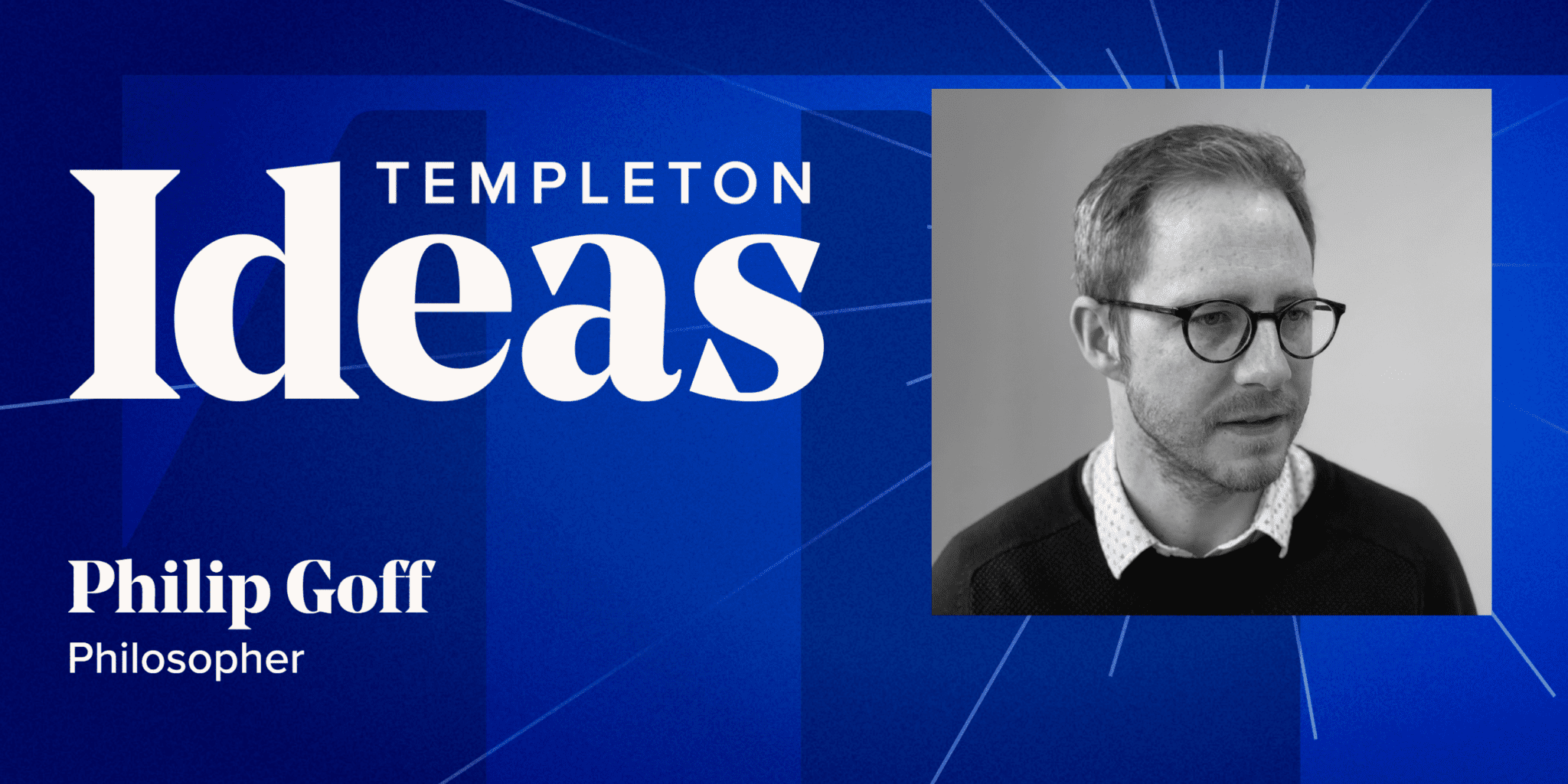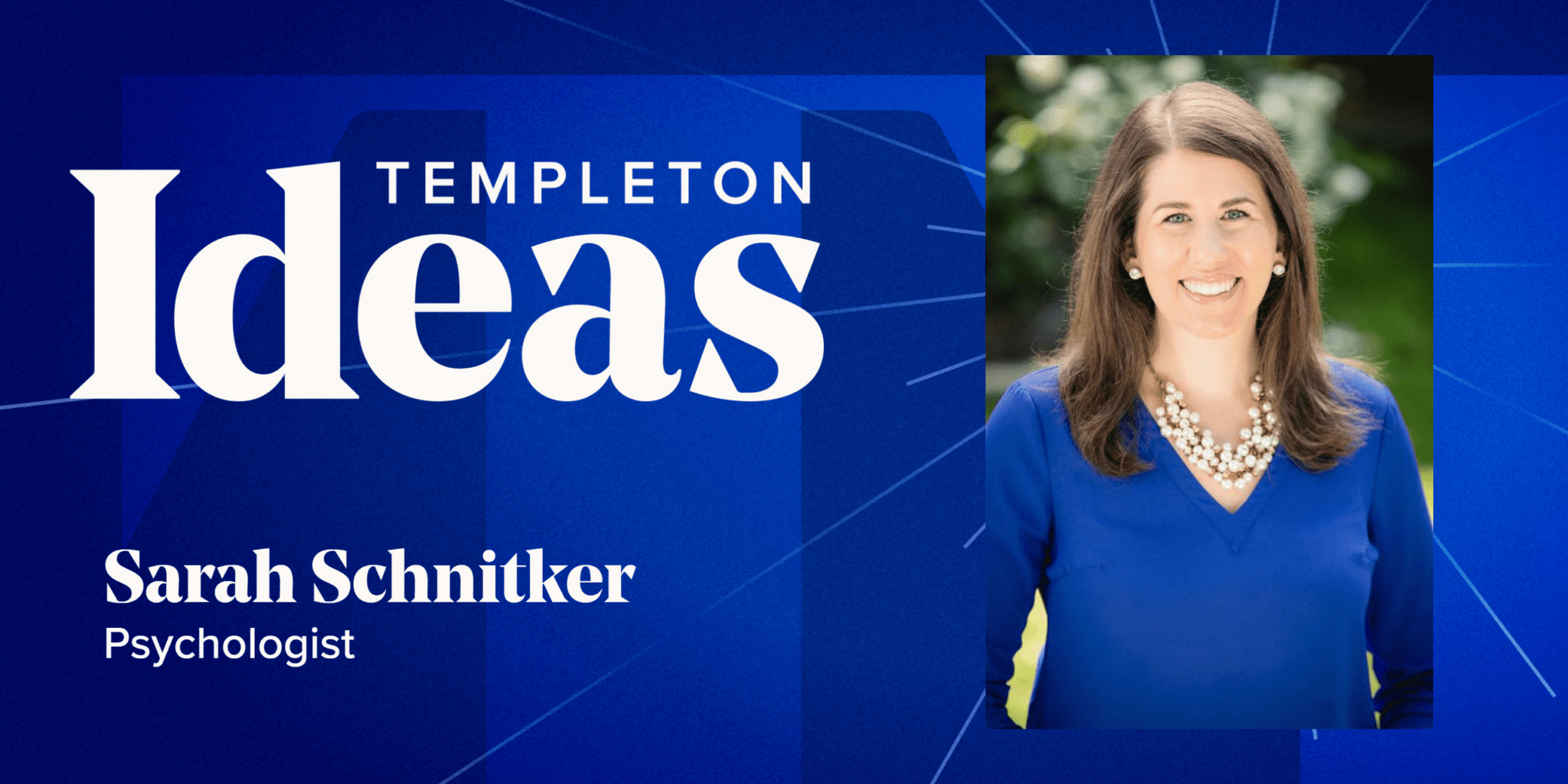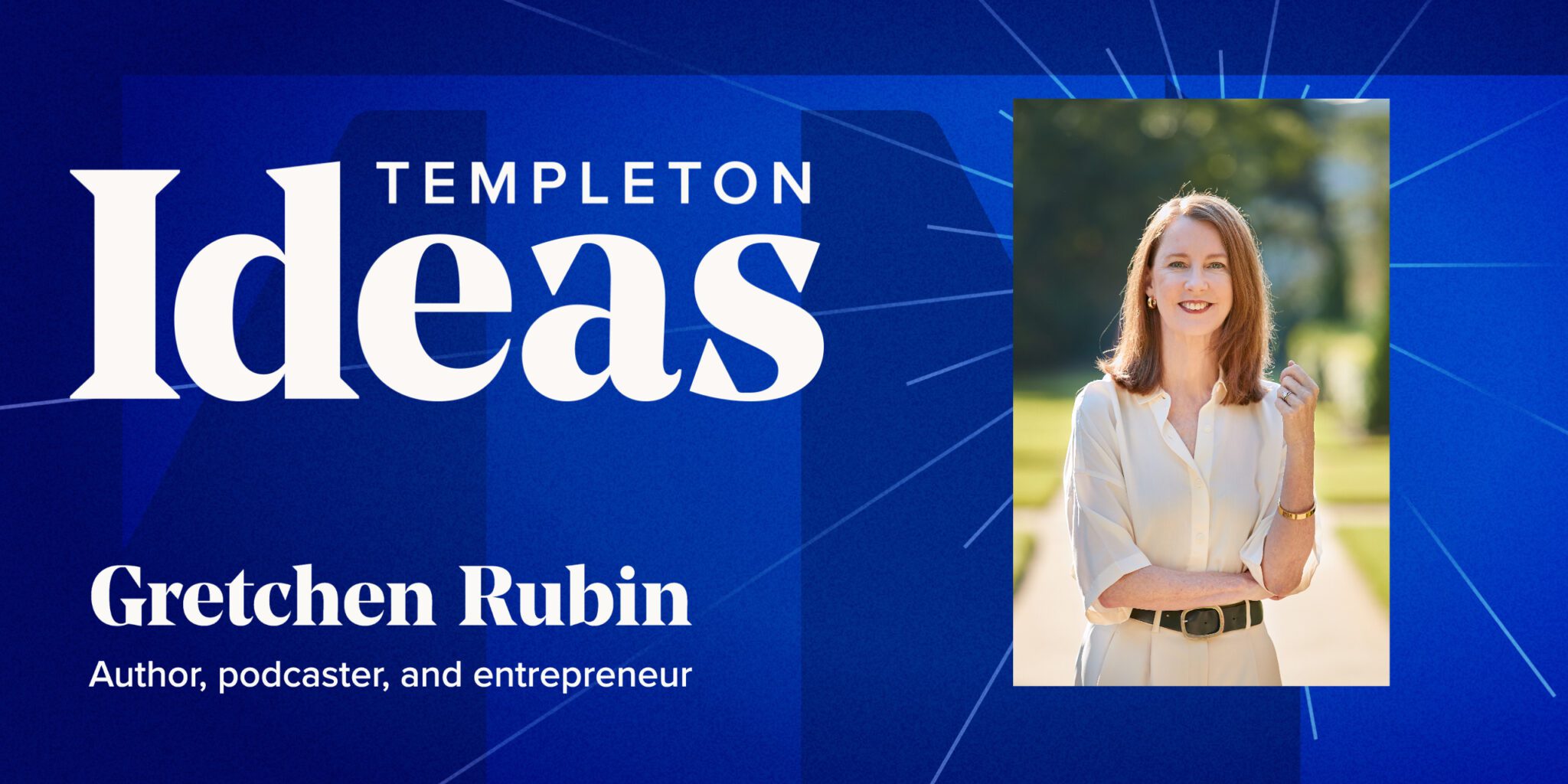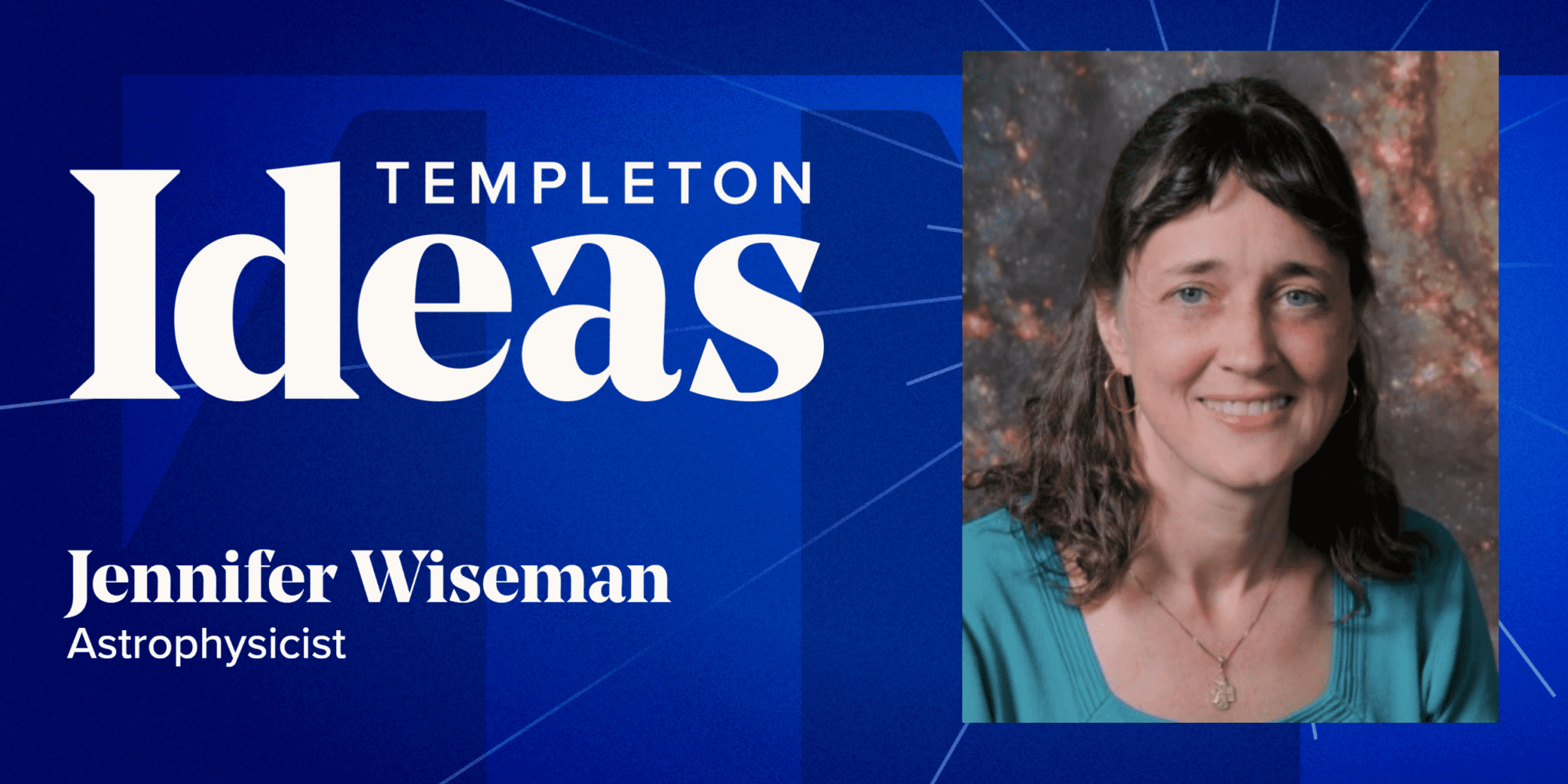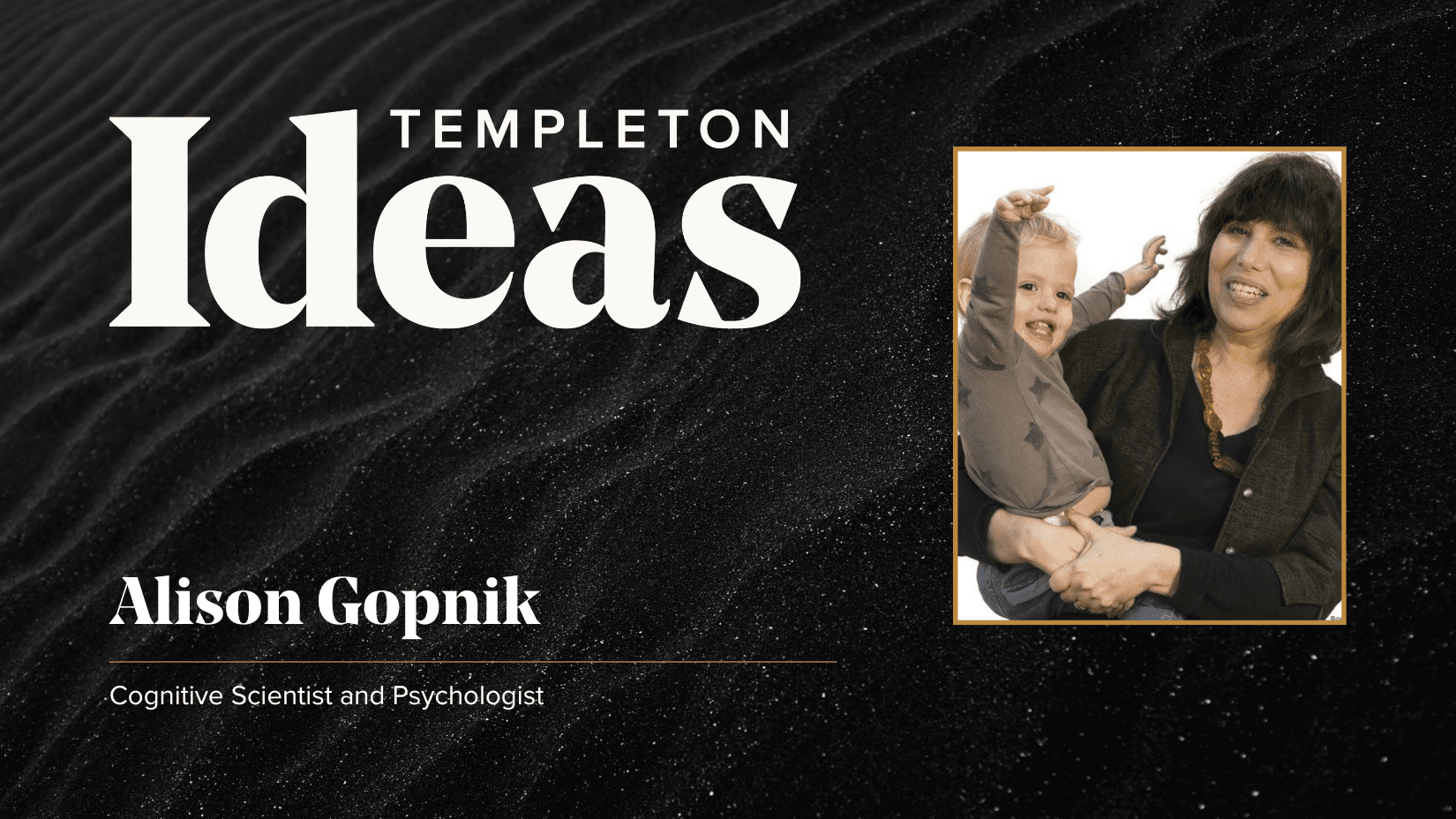The Templeton Ideas Podcast is a show about the most awe-inspiring ideas in our world and the people who investigate them.
Dr. Philip Goff is an associate professor of philosophy at Durham University, who researches philosophy of mind and consciousness with a specific focus on how to integrate consciousness into a scientific worldview. His popular book, Galileo’s Error, posits the theory of panpsychism as a plausible explanation for human consciousness. Philip joins the podcast to discuss his lifelong struggle with the problem of consciousness, the relationship between panpsychism and physics, and why he believes there is good philosophical reason to be optimistic about the future of our world.
Transcripts of our episodes are made available as soon as possible. They are not fully edited for grammar or spelling.
THOMAS BURNETT: You wrote in Galileo’s Error that you were obsessed with the problem of consciousness for as long as you can remember, and I was curious, is there an episode from your youth that you could tell me about struggling with specific questions?
PHILIP GOFF: Yeah, I mean, as you say, as far back as I can remember, this question has kind of irritated me in a way. Some people sometimes think I like mystery, but actually I think I’m more driven because I don’t like mystery. You know? I wanna solve the puzzle, I wanna know how things work. But I think as far back as I can remember, more generally, I suppose I’ve been interested in how we fit together. The different stories we tell about reality.
I remember when I, when I was quite young, I was eight or nine or something. I was really interested in black holes and cosmology and, but I was also raised Catholic and in Sunday school I was hearing about Adam and Eve and so on, and I remember asking the priest, how do these two stories fit together? The Big Bang on the one hand and the Garden of Eden on the other, there seems a bit of tension, at least here, and it’s sort of a tension like that that has always motivated me, and how do we bring those two stories together?
But I’ve always found consciousness the most challenging perhaps because in all these other cases of troubling, puzzling phenomena, it’s always at least an option to say maybe it doesn’t really exist.
This one thing that’s so hard to deny and yet is so hard to fit into our standard scientific story of reality.
THOMAS BURNETT: Were there any particular books or films that you saw when you were young that really set you on fire and maybe set you down a path where you thought, I’m getting some traction here, or is more of an internal dialogue where you were developing your thoughts.
PHILIP GOFF: Yeah. I remember the film, was it from the 90s? “Being John Malkovich”, where the characters find this abandoned office building with this small tunnel you could crawl through. And as they crawl through and they get deeper and deeper and they suddenly get pulled along, and then suddenly they find themselves being John Malkovich, the actor John Malkovich, looking out of his eyes, hearing from his ears, learning what it’s like to be him. And I think that was a wonderful, vivid way of representing what consciousness is. Consciousness is really simply what it’s like to be you. What you see, what you hear, what you feel, your thoughts, your emotions, all parts of your living conscious experience.
Another reason consciousness is such a challenge to science, because in science we’re always trying to be objective. We’re trying to get what the philosopher Thomas Nagel called the view from nowhere.
Whereas with consciousness, to understand the consciousness of a creature, you have to adopt its perspective, look out of its eyes.
And I think that film gave a wonderful way into thinking about what consciousness is. But I think maybe it was while studying philosophy at high school, reading Descartes that really inspired me. And I think Descartes got a lot of things wrong, but I think what he got totally right in my view is what he covers in the first two meditations of his famous text, “The Meditations”. And in the first two meditations, Descartes concludes that the mind is better known than the body. So, I think there’s something quite solid and foundational there.
And then the challenge, of course, is how do we fit these two things together? The external world we know about through our sensors. We get more precise learning through science and consciousness, which we know just through our immediate awareness of our feelings and experiences. How do these two seemingly very different things fit together in a single unified theory of reality?
THOMAS BURNETT: When you started your undergraduate studies, would you have characterized yourself as a materialist? What was your basic worldview when you came to the university?
PHILIP GOFF: When I studied philosophy, we were taught basically, either you were a dualist and you thought it was something kind of a bit magical and mysterious outside of the physical workings of the body and brain, or you were just a materialist and you thought consciousness is just electrochemical signaling in the brain.
And first I defended materialism. I thought that was the scientifically credible view. I’d, at that point, turned my back on religious upbringing and thought that you know, science was the way forward and that was the view I held for a couple of years when I was studying philosophy, but I just gradually became persuaded by philosophical arguments that we can’t fully account for conscious experience in the terms of physical science. And so, a materialist view of consciousness just wasn’t really an option, but at that point, rather than giving up materialism, I decided instead that conscious experience didn’t exist. I decided consciousness must be just like magic or fairies, the kind of things we used to believe in. But the onward march of science has shown doesn’t really exist.
And I tried for some time to really live that out and persuade other people. At some point I just couldn’t do it anymore and sort of came to a head for some reason, sitting in a bar, listening to music, having a cigarette, you could smoke in bars in those days, and I don’t know what it was, but maybe the beat of the music or the rush of the nicotine or the taste of the beer, but I just had this overwhelming sense of the reality of my own consciousness, my own feelings and experiences, and I remember running out of the bar in the pouring rain. I just couldn’t deny it any longer. Consciousness was undeniably real, and if we had to rethink science to accommodate that, then that’s what we have to do.
I’d rejected materialism, but the dualist option didn’t fit right with me either. I actually wrote my end of degree dissertation, arguing that the problem of consciousness is just irresolvable.
THOMAS BURNETT: Tell me about, how did you discover a third way, something that seemed like might be fruitful beyond, say, materialism and dualism?
PHILIP GOFF: I think it was just by accident really. It came across a paper by the philosopher Thomas Nagel from the 1970s on panpsychism. It was like a revelation, I suppose, just saying that there was this, as you say, third way, this middle way option that initially sounds a bit wacky. But just avoids all the deep difficulties with those two more familiar conventional options of dualism on the one hand and materialism on the other. It just very neatly avoided all the problems. And so, yeah, I just do remember an intense sense of intellectual piece really. There was a theory here, which could accommodate the scientific truth of observation experiments, which is of course so important, but also as it were, the human truth, the evident reality of one’s own feelings and experiences.
So, this was just really exciting moment, I think. And so, I promptly found the only philosophy department in the country that had a panpsychism professor, which was Galen Strawson at the University of Reading, and the following year I started graduate study and it kind of worked out okay.
THOMAS BURNETT: For our listeners who haven’t heard the term panpsychism before, could you provide a definition that you use to introduce to people?
PHILIP GOFF: Yeah, so I guess in our more familiar way of thinking about things, consciousness exists only in the brains of highly evolved organisms, and so only in a tiny part of the universe and only in very recent history according to panpsychism, in contrast, consciousness pervades the universe and is a fundamental feature of it. So, it doesn’t literally mean everything is conscious despite the etymology of the word pan means everything, psyche, mind or consciousness. The basic commitment, at least of contemporary panpsychist is that the fundamental building blocks of reality, perhaps fundamental particles like electrons or quarks have incredibly simple forms of experience and that the very complex experience of the human or animal brain is somehow derived from or built up from these more simple, rudimentary forms of consciousness at the level of fundamental physics. So, the view might be that the fundamental building blocks of the world are conscious, but the panpsychist need not think that every random arrangement of particles is conscious, so they need not think, you know, your socks are conscious, just that the tiniest things your socks have made up of, have some kind of conscious experience.
And even then, when we say an electron is conscious, we’re not talking about the kind of consciousness a human being has. We’re not saying an electron sitting there feeling bored or wondering if it’s Thursday yet or something. You know, human experiences, the result of millions of years of evolution, what it’s like to be a human being is incredibly rich and complex. What it’s like to be a sheep is maybe a bit simpler, what it’s like to be a bedbug, if there is something that it’s like to be a bedbug is presumably much simpler. And as we move to simpler and simpler forms of life, we find simpler and simpler forms of consciousness. So, for the panpsychist, that continuum keeps going down to the fundamental building blocks of reality.
THOMAS BURNETT: To what degree is panpsychism compatible, for instance, with what we know from contemporary physics?
PHILIP GOFF: The thought is that there’s a deeper layer of reality underneath physics. So, it’s a little bit like a cellular biologist who’s heard physicists talking about the quantum wave function, and this cellular biologist says, well, I’ve known all about the cellular structure of organisms. I don’t see it. I’ve never found a quantum wave function or found a need to postulate that. I don’t think it exists. Well, no, you wouldn’t have found it because the wave function is at a deeper level of reality than cellular physics, it’s a level or two below. But similarly, for the panpsychist, the underlying fact about fundamental consciousness is at a level below physics.
So, it’s sort of the panpsychist kind of turns materialism on its head. The materialist starts with matter, as understood by physics and tries to get consciousness out of that. I would argue we’ve never had any success at that explanatory project. I think there are pretty good arguments that it can’t be done. The panpsychist turns that on its head, they start with consciousness and try to make sense of physics emerging from consciousness. So, we can’t get consciousness out of physics. But we can get physics out of consciousness, and that’s really the core of the appeal of the panpsychist worldview to me.
MIDROLL
THOMAS BURNETT: We’ve talked a lot about how panpsychism relates to science, but I wanna talk about how panpsychism relates to being human. A big problem I think, in our contemporary culture is that a lot of us feel a sense of alienation, a sense that we don’t belong, a sense of being cast adrift. Does panpsychism give us any leverage to speak to questions of human existence? Of human values?
PHILIP GOFF: It’s an important question, Tom, and consciousness is arguably the source of everything that really matters in life, from deep emotions, subtle thoughts, wonderful sensory experiences. So, I do think it matters. I, this is controversial, but I believe, and I would argue on philosophical grounds, that our current scientific worldview of materialism is actually incompatible with the reality of consciousness. If materialism was true, there wouldn’t be consciousness. That’s obviously a controversial view, but that is what I think. And if that’s right, we are at a very peculiar period of history where our official worldview is inconsistent with that which is most evident and that which gives life meaning.
And I think that does in some way, even if people haven’t thought through all the technical details, I think that does impact people. You know, people say things like, oh, I don’t think love is just chemicals in the brain. And I think that’s a very sort of simple way of stating a conviction that that I think can be demonstrated on philosophical grounds. And so, I do think this does lead to a deep sense of alienation, a sense that we don’t fit into the world that science is telling us about. And so, I think what is attractive about panpsychism is it is a way of accommodating both crucially, the facts of natural science, the facts of observation experiments, but also as it were, the human truth, the evident reality of our own feelings and experiences bringing these together in a single, unified picture of reality.
There are also more specific implications, I think panpsychism can lead to a better relationship with the natural world. If you’re a materialist and a tree is just a mechanism, then really it only has value indirectly in terms of what it can do for us in terms of looking pretty or sustaining our existence more importantly. But if you think a tree is a conscious organism, albeit of a very alien kind, then a tree is a locus of moral worth in its own right. You know, these terrible forest fires we saw in recent years in Brazil under Bolsonaro. You know, if you see those as the burning of conscious organisms, there’s a whole added moral dimension there.
THOMAS BURNETT: I am eager to see how our children grow up and how they think about the world and their place in it differently than we do. But in the meantime, I wanna ask you how your study of panpsychism has changed you over time. You’ve been engaging with it now for a number of years. How’s it shaped the way that perhaps you view yourself, the way that you view the reality that surrounds you?
PHILIP GOFF: I think the biggest impact was that initial revelation upon discovering it and just that really difficult tension in my worldview was suddenly resolved and I don’t think I’ve ever had anything quite like that.
It's helped me also think about spiritual questions that we haven't so much touched on in later years. That wasn't my initial attraction, but slowly over time, I think panpsychism has allowed me to embrace a richer spiritual conception of reality.
THOMAS BURNETT: I’m wondering what gives you hope about the future. We have a lot of things to be concerned about, environmental catastrophes, rise of authoritarianism. Are there things that in your philosophical reflection that make you hopeful looking forward to when our children are adults and what they’ll be thinking about and striving towards?
PHILIP GOFF: I feel confident we’re gonna come out of this at some point. I’ve actually come to think on both philosophical and scientific grounds that there is actually good reason to take seriously the possibility that there is a purpose to existence, which is actually the focus of a new book ever coming out called “Why the Purpose of the Universe”. And I think this can lead to a very meaningful way of living life. To live in hope that there is a point to existence and the good you do contributes in some small way to that greater purpose, even if we don’t fully understand yet what that greater purpose is.
So, I think there is potential both on scientific and philosophical grounds for a much more optimistic picture of reality and so that gives me hope, even if things seem a bit bleak right now.
THOMAS BURNETT: I appreciate you taking that time to talk to me today.
PHILIP GOFF: Brilliant. Thank you very much.
CREDITS
ABBY PONTICELLO: You’ve been listening to Templeton Ideas from the John Templeton Foundation, where we fund research and tell stories that inspire people with awe and wonder. We’re proud to support leading scientists, philosophers, and theologians from around the world. Learn about the latest discoveries related to black holes, complexity, forgiveness, and free will at templeton.org/news.
If you like what you’ve heard so far, follow us and leave us a review wherever you get your podcasts. Our program was produced by Jakob Lewis with great Feeling Studios. Our theme song is by Dan Burns. Our staff includes Thomas Burnett, Abby Ponticello, Benjamin Carlson, David Nassar, Gerald Nelson, Alyssa Settefrati, and Juliette Plummer.
